Viewpoint: How should we remember a war?
- Published
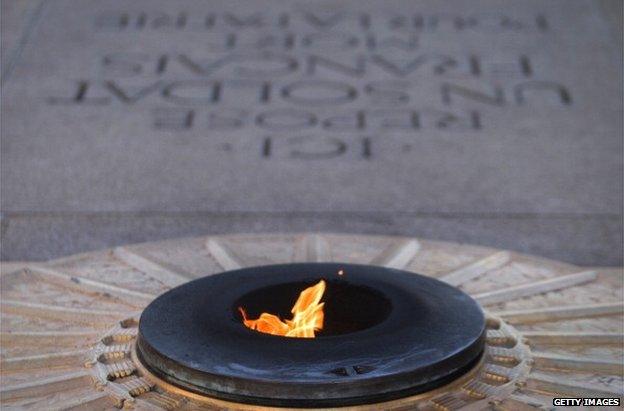
As the UK gets ready to mark the centenary of WW1, the very nature of memorials is changing, argues Dr Sam Edwards.
It all started with a bike ride. We'd planned it at school during French on a Friday afternoon, but when Saturday dawned, I wasn't so sure. The wind blew and the rain fell. But we pressed on, and in time the winds eased, and our progress improved.
Soon we were heading towards our destination - Flixton Airfield. Once there we began the adventure. As we wandered through abandoned Nissen huts and field-walked for spent munitions, we imagined what had once been in this now quiet corner of rural England.
For back in the summer of 1943, Flixton Airfield had been one of nearly 70 locations occupied by the men and machines of the United States Eighth Air Force.
Today, amongst the most visible reminders of this presence, reminders that so often claimed my attention during my teenage cycling expeditions, are war memorials, hundreds of which have been built in East Anglia over the last 70 years.
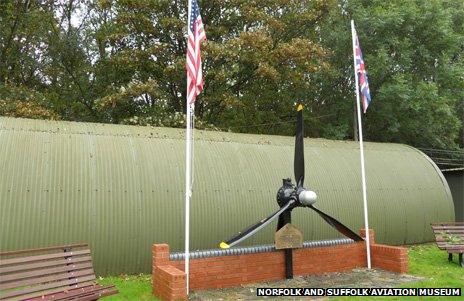
Memorial at Flixton's Norfolk and Suffolk Aviation Museum
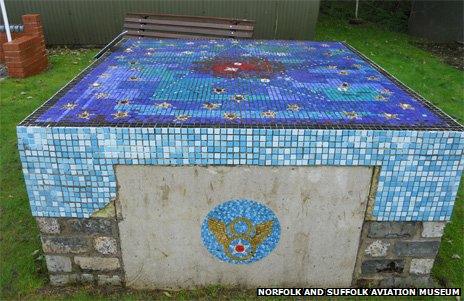
Rescued remains of a memorial to the 446th Bomb Group USAAF
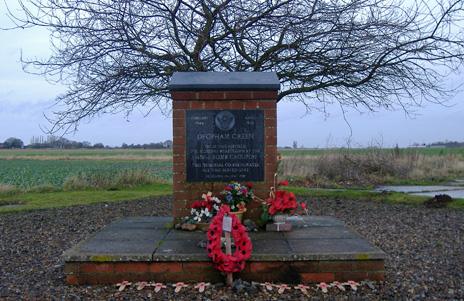
A memorial at Deopham Green, Norfolk, used by the US Air Force in WW2
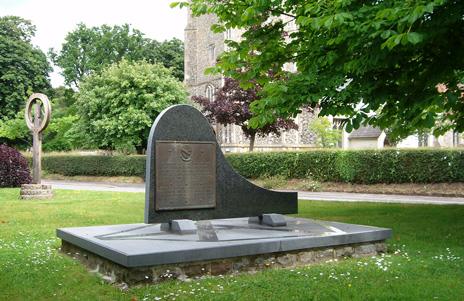
Remembering the US 95th Bombardment Group in Horham, Suffolk...
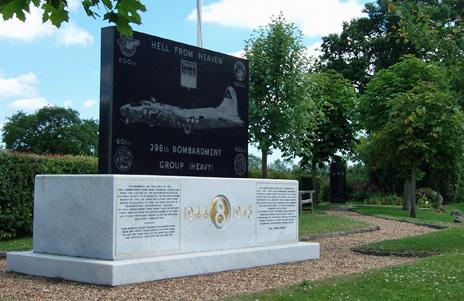
... the US 338th Bombardment Group in Nuthampstead, Herts...
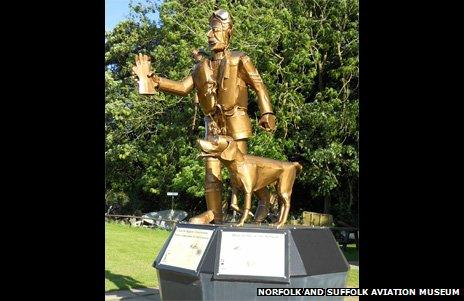
... and a memorial to British and Commonwealth pilots lost in WW2
The forms of these memorials vary. Some are evocative stained glass windows that mourn the celestial sacrifice of the airmen of the Mighty Eighth. Some are simple plaques inscribing the names of airmen lost in the tumult of the clouds. Some seek to deny the transience of time with granite and marble.
All are poignant and moving.
All contribute a stanza to what George Macaulay Trevelyan would famously call the poetry of history. I have visited these memorials more times than I can remember. It was here that my interest in the commemoration of war first developed. Building memorials like those established in East Anglia after 1945 was not a new phenomenon.
Its history can be traced to the dedication to the fallen after the Battle of Thermopylae in 480BC.
But if the commemoration of war has a long history, the 20th Century nonetheless witnessed a significant shift in the scale and extent of the enterprise. For in the aftermath of the death and destruction visited upon the Western Front, communities across Britain built memorials to the fallen. No longer would the aftermath of war just produce monuments to the great and the good, to the Nelsons and Wellingtons. Now, all those who fought and died were marked with stone and statuary.
And like the Spartans at Thermopylae, many of these newly established monuments turned to the concept of sacrifice.
The death of Tommy Atkins (the slang term for any private soldier) was defined as a heroic sacrifice for the nation.
Hence the great memorials to that conflict built in London - the Cenotaph and the Tomb of the Unknown Warrior. Hence too, the creation of battlefield cemeteries and the foundation of the Imperial War Graves Commission. Taken together, these memorials forge permanent and poignant bonds, a landscape of memory linking nameless bodies in France to bodiless names in Britain. Monuments all to a generation that served and sacrificed at the national altar.
But with the sad passing of Harry Patch in 2009, the last surviving veteran of World War One's trenches, the time is now also right to return to the experiences and events of that Edwardian Winter with fresh eyes and new ideas.
The time is right to complicate our traditions of commemoration - not as a means to denigrate or dismiss the sacrifices asked of - and given by - British soldiers, but in order to recast the prism through which these sacrifices are refracted.
For the events of 1914-18 did not just butcher a generation on the fields of Flanders, nor did those events only become synonymous with mud and murder. World War One was also central to the enfranchisement of women, to the extension of democracy, to the origins of the welfare state, to the cleaning and rebuilding of decayed Victorian towns, to the acceptance of pacifism as a legitimate politics of protest, to improved social mobility and increased social unrest, and to the ultimate end of Empire.
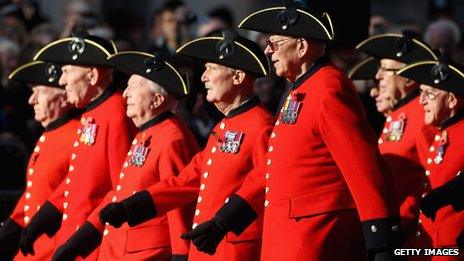
Next year there will be a multitude of memorial services
In short, the time is now right to complicate how we commemorate WW1 so that the previously neglected and forgotten might be remembered, and commemorated.
But to reclaim the forgotten and to restore the neglected will demand a new approach to commemoration. Commemoration thrives when it is active and involving - when it elicits the energies and interests of people.
So the success of the Centennial of WW1 will lie with the extent to which we are able to use commemoration to interrogate the shape and structure of our world today - a forum to explore the extent to which who we are is, in part, who we were.
Recognising this past-present dynamic also means embracing new ideas, and new commemorative forms, forms that speak to the mores of contemporary society. Above all, it means embracing the idea of living memorials, memorials that chart not only the war's cost in lives, but that also explore consequences and legacies. The concept of a living memorial is by no means without precedent, but ours is an age peculiarly well-equipped to develop the idea in exciting and innovative ways. For ours is the digital age, the era of the virtual world.
Much work still needs to be done to explore how the virtual world can be harnessed for the work of successful commemoration, and problems will certainly arise. But all would draw strength from their virtual existence, all would provide space for involvement, spontaneity, discussion and engagement. All would live.
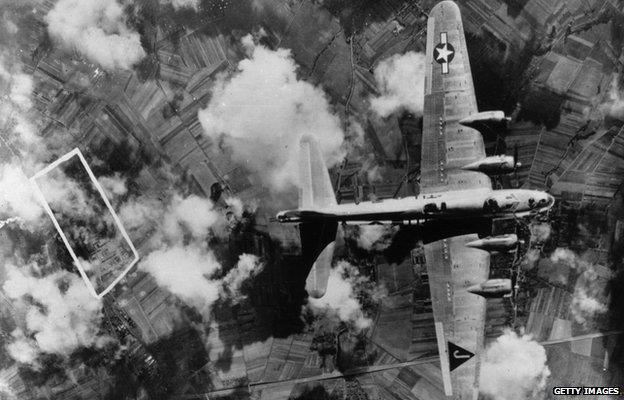
An Eighth Air Force bomber seen from above
Like the invention of the printing press many centuries earlier, this is one of the great benefits of cyberspace - it promotes connection and dissemination, and it demands interaction. Best of all, for commemoration, the internet decries deification and instead promotes fluidity of image and idea.
Acknowledging the past-present dynamic shaping our approach to public remembrance, and embracing the potential of new commemorative technologies, also opens up avenues for complicating how we remember other conflicts. From major anniversaries of Korea to the Falklands, we are sometimes overwhelmed by memory, by demands that we remember.
And too often, such endless demands produce the commemorative equivalent of rote learning - we remember because we're told to remember. But why do we remember? And what should we remember?
In an age that assumes nothing is real unless it has been represented, and in which no opinion matters until it has been blogged, successful commemoration demands eliciting an engaged response. It demands that we open up the forums of commemoration - so often closed and controlled - into spaces that accommodate questions and criticism.
In so doing, we can also reconsider the very purpose of commemoration. The last 70 years has been the era of decolonisation and devolution, and the withering of the nation state. Yet despite this we place the Great War and the Good War at the heart of our commemorative culture. Still we return to the mourning and memorialising of war.
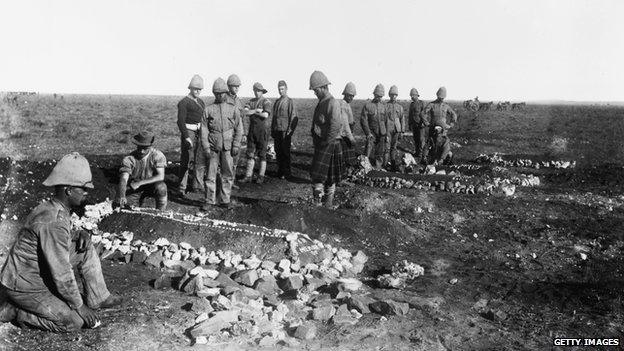
Many memorials revolve around the idea of sacrifice, often in a far-off land
To a degree, the fall that followed is of course the motive factor - British people remember the wars because we mourn the loss of power, prestige and unity that they encompassed, and which they so fatally undermined. But, in continuing to place the remembrance of war at the very centre of our national culture, we also overlook and obscure other histories, and other pasts.
Our landscape is rightly marked by monuments to those whose lives were sacrificed on the field of battle. But what about those whose lives were taken to build an Empire? What about the disenfranchised and dispossessed? What about those killed after descending into the earth's bowels to mine its minerals during one of the bloodiest campaigns of modernity - industrialisation? What about those who battled and bled not for national security, but for civil rights?
As a society, we have long been comfortable with the idea of remembering the heroics witnessed at Waterloo. But we are yet to adjust to the idea that perhaps we should also remember the murder at Peterloo.
The commemoration of war must force us to remember the people - victors and victims, men and women, patriots and pacifists, soldiers and civilians, it must connect, confront and complicate, rather than just celebrate, petrify and simplify.
This is the challenge of war commemoration as the global conflicts of the 20th Century drift further into the past. It is not the challenge for the Lost Generation of 1918, nor for the Greatest Generation of 1945 - their work is done. This is the challenge for the future, for our generation.
This is an edited version of Sam Edwards' Four Thought, which will be broadcast on BBC Radio 4 at 20:45 GMT on 6 November 2013.
Follow @BBCNewsMagazine, external on Twitter and on Facebook, external